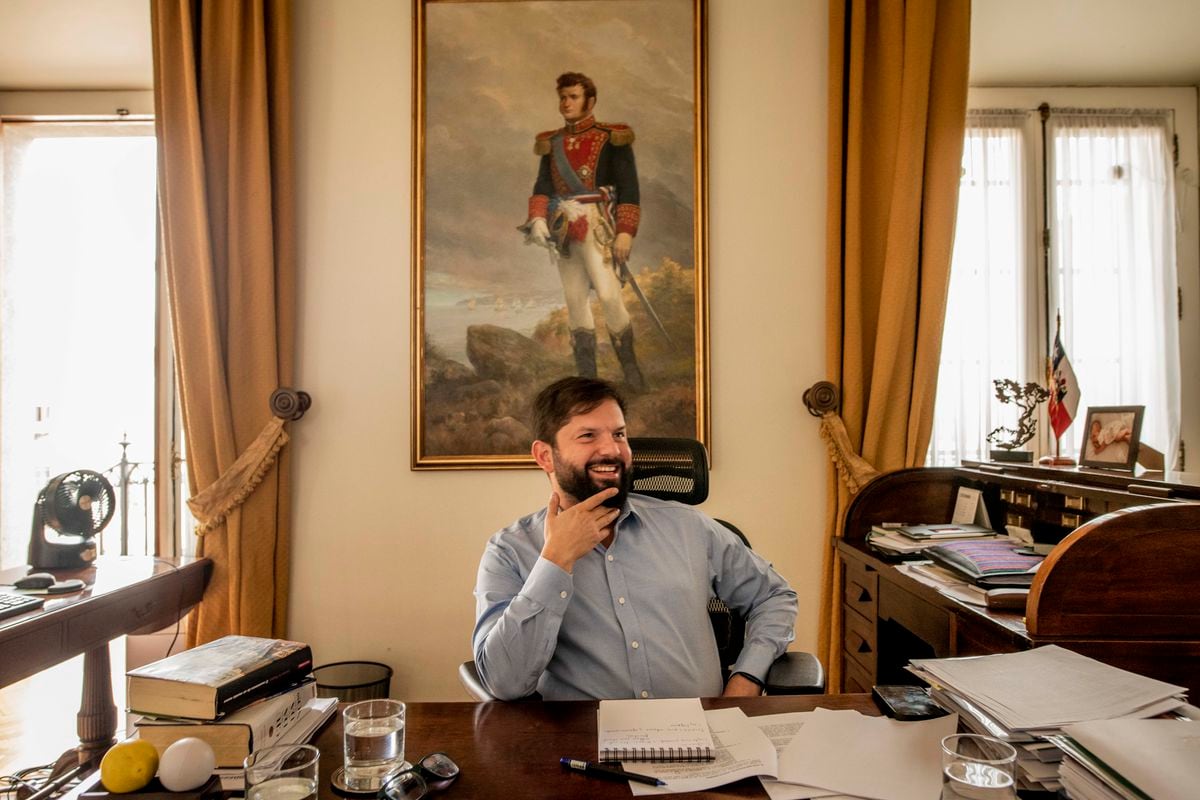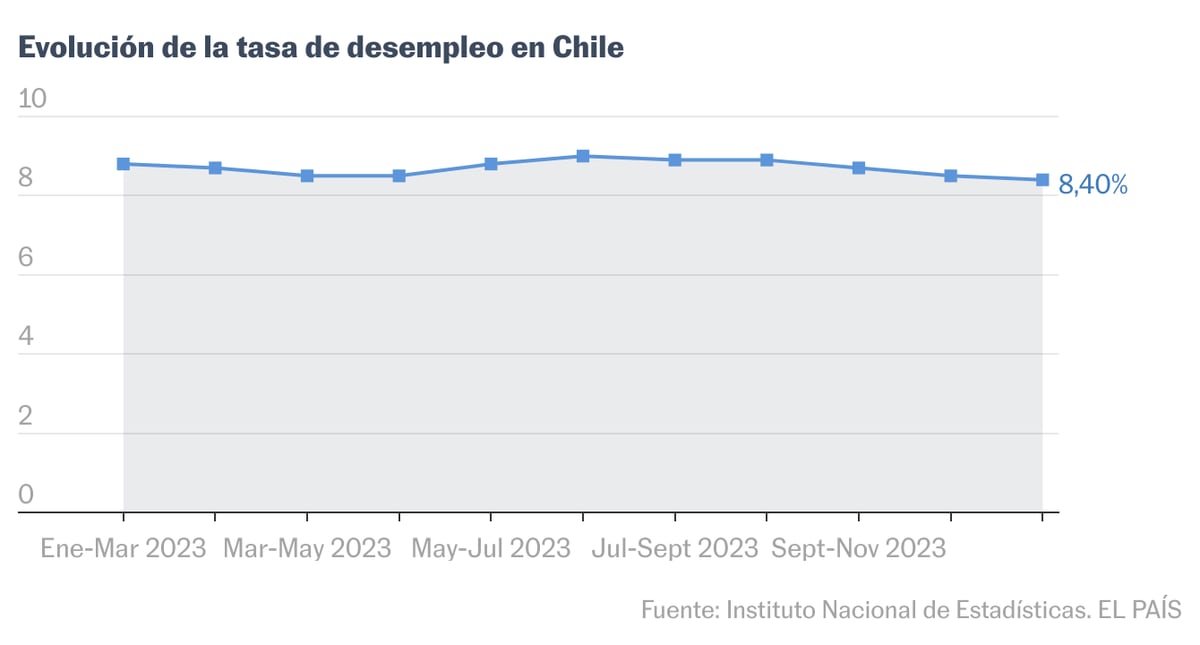Jeannette Jara, Minister of Labor and Social Welfare, in Chile.RS
The Chilean Minister of Labor and Social Welfare, the lawyer Jeannette Jara (Santiago, 48 years old), leads the portfolio responsible for one of the great commitments of the Government of Gabriel Boric: to reform the pension system, which since the dictatorship of Augusto Pinochet has been It is based on a capitalization system managed by private companies, the AFPs.
The communist militant, who served as undersecretary of Social Welfare in the second Bachelet government (2014-2018), attends this interview by videoconference from Geneva, the last stop on a tour where she met with her peers from the OECD countries and with leaders of the International Labor Organization (ILO).
“They are following very carefully how we are defining the future of our country,” says the former union leader.
Ask.
The objectives of his portfolio -increase the minimum wage, reduce the working day, pension reform- are subject to a tax reform and a healthy economy.
What will happen if the reform is not approved or the economy worsens?
Response.
In Chile we have been living through times of profound transformation since October 2019. Labor rights and social security are measures that have been postponed many times.
When there were important growth figures, it was indicated that it was not the time because the growth by dripping would still reach the others.
When I was slower, it wasn't because we were in a difficult situation.
In our view, this is the time to move forward.
Undoubtedly, the concrete challenge we have is to make changes in a complex international economic context that hits us.
P.
You say that it is time to move forward, but is it feasible with such a complex economic situation?
R.
The Chilean economy has shown significant resilience, even after a crisis as severe as covid-19.
Undoubtedly, for some sectors in Chile, it is never the time to advance workers' rights.
Never.
Neither when the country is doing well, nor when it is doing more or less, nor when it is doing badly.
Maintain the levels of inequality, which have generated a social gap between those few who have more and the majority of the people... That is what is bad for people's lives, for the economy, for employment, for growth.
We must increase productivity challenges, support SMEs, promote formal employment, but also advance workers' rights, this cannot be postponed again.
P.
Where is Chile looking in labor matters?
A.
President Gabriel Boric made advancing towards decent work one of his central axes.
This concept, which is not as internalized in Chile as it is in the international labor system, implies an important challenge in terms of security, access to social security and avoiding discrimination and inequities that occur in employment.
Chile has the capacity to strengthen its own labor rights model by drawing on international experiences.
P.
Collecting the experiences of which countries?
A.
It depends on the theme.
In collective bargaining, which is one of the issues we want to address to strengthen collective rights, we seek to advance in multilevel bargaining: company, intercompany, and branch [negotiate by branch of economic activity].
In Chile the latter does not exist.
What we are going to do is modify the law and legislate the branch negotiation.
They are looking at models from different OECD countries as well as other Latin American ones.
In terms of social security, linked to the issue of pensions, we are looking at countries that have mixed systems, with payment schemes for benefits or benefits or pensions, and that have actuarial models that make them sustainable over time.
More than a country in particular, we are looking at a range.
Q.
These are the priorities of the ministry?
Strengthen collective rights and pension reform?
R.
President Gabriel Boric raised four priorities for this year.
First, recover pre-pandemic employment [200,000 jobs are missing].
Second, increase the minimum wage by 14%, the highest readjustment in 25 years.
[Part of the increase was applied in May and in August it should reach 476 dollars].
It was a measure agreed upon with the Central Unitaria de Trabajadores (CUT) and with small and medium-sized enterprises (SMEs).
Third, to present in August the bill to reform the pension system, which essentially seeks two things: take charge of the failure of the AFPs, improving current and future pensions, and create a social security system in Chile, where solidarity in the contributory pillar -within the contribution system- is a present element and is not only individual.
Fourth,
Q.
One of the big doubts about the pension reform is whether the new system will allow individual capitalization and whether the funds will be able to be inherited.
R.
The details of the project will be presented in a couple of months.
I can anticipate that it seeks to promote a mixed system, where there is individual capitalization, but also solidarity intergenerational transfers, because that is how social security is understood as part of a human rights system, with solidarity.
P.
They advanced the date to present the project in Congress before the September plebiscite on the new Constitution
R.
Yes, because many
fake news
have been raised in relation to pension funds, to which there was some intention to expropriate and neither the Government nor the proposed Constitution consider this possibility.
Although no one has mentioned it, we believe that it is better to present it now because when there is a public concern, it is best to take charge in a transparent manner.
Q.
Chile is one of the OECD countries with the longest working hours, but also one of the least productive.
How should the reduction of the working day to 40 hours impact?
R.
The main challenge is productivity, which has been stagnant for 10 years.
Just as we must advance in reducing the working day for good living, we must also take measures in productive matters related to the best use of technologies, investment in innovation, in science.
P.
Are you going to support SMEs?
A.
In the case of SMEs, you must have a working day reduction facility, understanding that they are the generators of more than 50% of employment in the country, but that their level of participation is close to 13% of sales.
In this case, along with applying the 40 hours gradually, we must see the other measures that support that SMEs can participate more and that our market is not so concentrated in large companies.
Q.
If the project goes ahead, when will 40 hours be worked in Chile?
R.
The experience of other countries has shown us that a gradual reduction of one hour a year is not convenient because it forces employers to have higher administrative costs.
We are going to define the exact term after listening to the economic and productive sectors because that is the meaning of the technical tables.
Subscribe here to the EL PAÍS América newsletter and receive all the key information on current affairs in the region.









